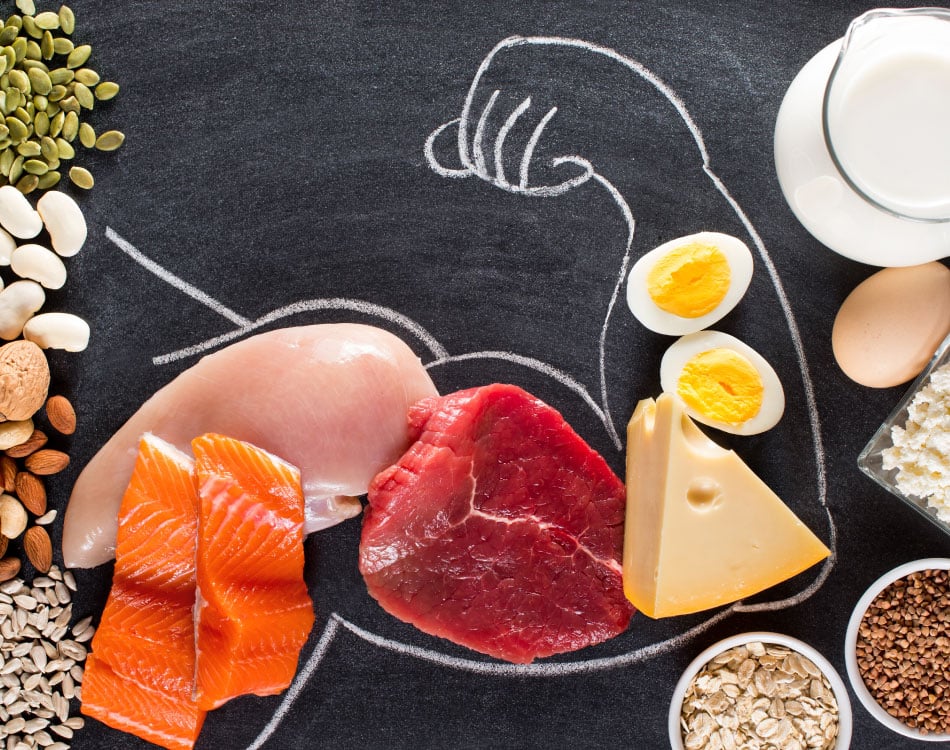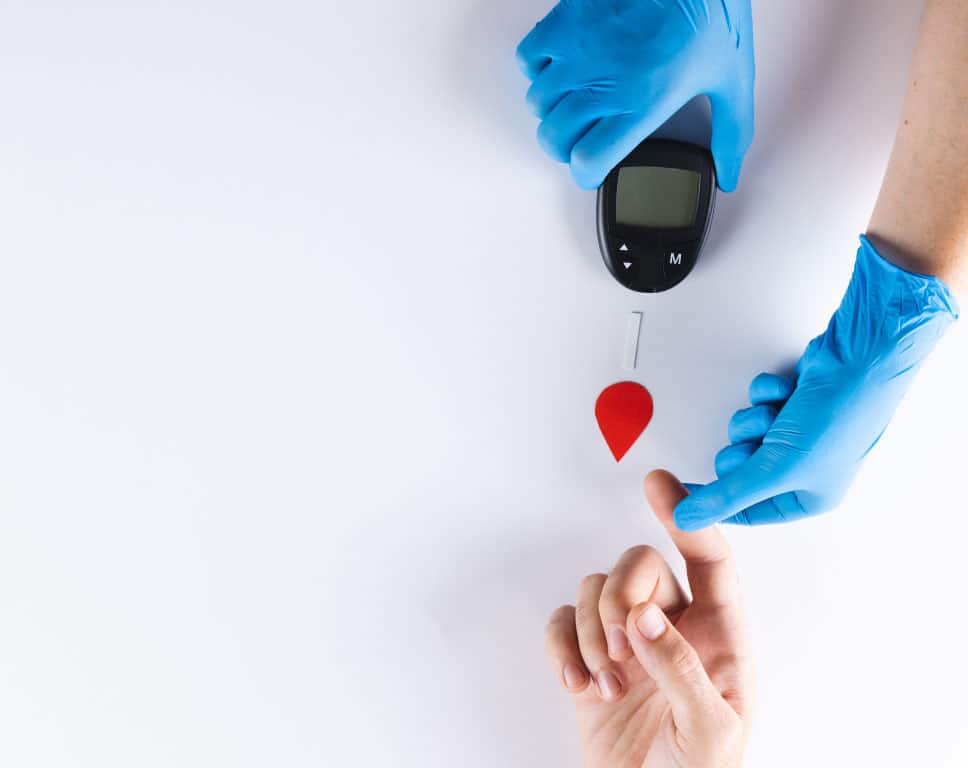By Cherise Potgieter & Owen Dunderdale RD (SA)
Your weight gain or inability to lose weight, despite your best efforts, may be caused by a medical condition, rather than an ineffective approach to weight loss.
When this happens it can often feel as if we’re stuck in the weight-loss hamster wheel, constantly spinning at full speed but never getting anywhere.
If you find that you’re losing the battle against the bulge, despite sticking to a sound nutritional plan and exercise programme, then it may be time to visit your doctor to determine if you’re suffering from one (or more) of these increasingly more common medical conditions.
Insulin resistance leads to weight gain
Insulin is a hormone that is released by your pancreas in response to a rise in circulating glucose levels in the blood, which happens after eating certain types of food. It’s released in response to carbohydrates, proteins and fats, but insulin levels are highest after we eat carbs, especially high glycaemic index (GI) sources.
Carbohydrates are broken down in our digestive systems and enter the blood as glucose, thereby increasing our blood sugar levels.
After glucose enters the bloodstream, insulin is released to help glucose enter various cells, particularly muscle cells and other organs where the glucose is used to produce energy. Insulin can be considered a ‘key’ that unlocks the door to a cell, allowing glucose to enter.
Someone who suffers from insulin resistance will have cells with ‘broken locks’, which means insulin (the key) no longer opens the lock as effectively as before. The result is high blood glucose and insulin levels – conditions associated with type 2 diabetes and polycystic ovary syndrome.
In these instances, insulin can redirect blood glucose to fat cells, promoting greater fat storage by creating fat tissue within these cells.
It’s been a conundrum for decades; ‘does obesity cause insulin resistance or vice versa?’ The conclusion is simple: insulin resistance contributes to weight gain and obesity. Treating insulin resistance is therefore important to the success of your weight-loss journey.
Consequences of insulin resistance:
- Increased food cravings as cells are starved of glucose.
- Increased oestrogen levels, which is another risk factor for obesity.
- An overall increase in fat storage.
- Poor nutrient delivery to cells.
Insulin resistance is manageable through proper medication and healthy lifestyle changes, which involve the correct diet and exercise routine. It would be best to seek advice from a registered dietician and medical practitioner to get you on the correct diet and medication. Once this is in order, regular exercise for at least 30 minutes, 4 times per week is highly beneficial. It has also been shown that resistance training is more effective than cardiovascular training for the management of insulin resistance.
Identifying insulin resistance or type 2 diabetes:
Test your fasting blood glucose levels at a local clinic to assess if your blood sugar levels are normal. According to WedMD.com, common warnings signs of diabetes include:
- Increased thirst
- Increased hunger (especially after eating)
- Dry mouth
- Frequent urination or urinary tract infections
- Unexplained weight loss (even though you are eating and feel hungry)
- Fatigue
- Blurred vision
- Headaches
Depression and anxiety may be the source of your weight problem
Depression and anxiety have been shown to have an effect on eating behaviours, which may consequently lead to weight gain.
For instance, depression is often accompanied by overeating, which sufferers tend to use as a coping mechanism to deal with negative emotions linked to stress.
Individuals diagnosed with either depression or anxiety can also experience a change in appetite, and often use food as a reward and for gratification. This is particularly true of sweet or sugar-laden foods, as this help elevates mood, albeit temporarily.
In today’s society, food options and availability are greater than ever, which makes resisting cravings a lot more challenging. The combination of these factors means that those who suffer from depression and anxiety tend to pick up weight due to higher calorie intakes and poor food choices.
The subsequent weight gain may also deepen their depression, which means that by comfort eating they’re creating a vicious cycle that essentially makes their problem worse. As such, finding temporary mood gratification with food will lead to long-term complications for a person’s physical and psychological states.
Could you be depressed? Symptoms of depression include:
- Chronic feelings of anxiety or sadness.
- Loss of interest in things that were previously enjoyable.
- Feeling worthless.
- Insomnia or a change in sleeping patterns.
- Change in appetite.
- Fatigue and a general lack of energy and vitality.
- Suicidal thoughts.
- Irritability.
- Loss of concentration.
- Deterioration of social relationships.
The best way to deal with depression is to seek professional medical advice and assistance to determine the root cause of your depression and what are your emotional triggers.
Your general practitioner may refer you to a clinical psychologist or psychiatrist, depending on the severity of your condition.
Age is more than just a number in weight loss
As we age, we tend to lose muscle, which is metabolically active tissue. This means it contributes to a strong and healthy metabolism and burns more calories throughout the day, even while at rest.
If you lose muscle mass, your basal metabolic rate (BMR) will also decrease, which means your overall daily calorie expenditure will drops if your lifestyle and activity levels remain the same.
You will either need to reduce your calorie intake to maintain your goal weight or continue to lose weight. Your other option is to alter the type and amount of activity you engage in.
Strength and resistance training, which contributes to an increase in muscle tissue, which is particularly effective and highly recommended for older adults. In conjunction with the correct training routine, you should fuel your body with enough protein and calories to prevent muscle breakdown and boost muscle development.
It is best to seek the help of a qualified sports nutritionist or dietician when it comes to formulating a well-balanced diet plan to help you counteract these effects.
Cushing syndrome – the stress link to weight gain
Cushing syndrome, or hypercortisolism, occurs when a person’s body is exposed to abnormally high levels of cortisol for a prolonged period of time.
Cortisol is a stress hormone that is produced by your adrenal glands. While cortisol is needed for normal bodily functions such as energy production, mood regulation, and to control motivation and fear in certain parts of your brain, when produced in excess it can cause serious issues.
This can occur due to chronic stress, which can occur in various forms, such as physical, mental, psychological or environmental (or a combination of all of these), or prolonged use of corticosteroid medication.
Tell-tale signs that your body is developing Cushing syndrome include:
- Purple/pink stretch marks.
- Very sensitive skin that is thinning and bruises easily.
- An increase in healing time due to a compromised immune system.
- Greater susceptibility to infections.
- Rounded shape to your face.
Cushing syndrome may also lead to high blood pressure, loss of bone mass and, sometimes, type 2 diabetes.
The best way to resolve Cushing syndrome is to get your cortisol level back to normal, which should improve symptoms. The faster that you get a handle on your health and cortisol levels, the better your body’s chances are of recovering.
Additional symptoms of Cushing syndrome include:
- Pimples and acne.
- Chronic fatigue.
- Weakness in your muscles.
- Depression or anxiety.
- Difficulties in cognitive function.
- High blood pressure.
- Headaches.
- Loss of bone mass and bone strength.
- It is advisable to see a doctor if you are experiencing any of the symptoms associated with Cushing syndrome, especially if you have recently taken corticosteroid medication.
Hypothyroidism may wreck your metabolism
Hypothyroidism is a condition characterised by an under-active thyroid. This results in an insufficient supply of thyroid hormone – a very important metabolism-regulating hormone, which slows your metabolism.
As a consequence, you may gain weight, even if you eat the same amount of food. Your overall calorie expenditure will also decrease because your metabolic rate will be lower.
If left untreated, a person will eventually develop additional health problems, such as:
- Joint pain.
- Weight gain, which can lead to obesity.
- Infertility.
- Cardiovascular disease.
A sufferer’s symptoms may also increase in severity and worsen over time. You can also develop a goitre, which is an enlarged thyroid that produces a lump in your neck.
The best approach to deal with hypothyroidism is to visit an endocrinologist who can test for and diagnose the condition correctly. If diagnosed, the condition can usually be treated effectively with medication and/or a change in the lifestyle factors that have contributed to the development of the condition. A registered dietician can also create a diet plan that caters to the needs and deficiencies associated with and caused by hypothyroidism.
Symptoms of hypothyroidism will vary depending on the stage of the condition. They can include:
- Fatigue and tiredness.
- Sensitivity to cold.
- Constipation, irregular bowel movements.
- Dryer skin than usual.
- Increased weight and body fat levels.
- Decreased muscle strength.
- High cholesterol levels.
- Joint pain.
- Irregular menstrual cycles.
- Thinning hair and hair loss.
- Decreased pulse rate.
- Depression or anxiety.
- Poor memory.
PCOS a prime weight-gain culprit
Poly Cystic Ovary Syndrome or PCOS is a condition that affects many women by altering their natural hormonal levels. Sufferers tend to produce high amounts of male hormones, and the condition also causes the development of cysts on the ovaries.
PCOS can also lead to serious long-term health problems if it is not treated correctly, such as type 2 diabetes or cardiovascular disease. Sufferers also tend to pick up weight, predominantly in the form of body fat.
To diagnose PCOS women need to consult with their gynaecologist, who can prescribe the appropriate medication and treatment plan. Contraceptive pills and medication such as Glucophage for diabetes can help to recorrect the hormonal imbalances caused by PCOS.
It’s important to note that medication alone will not adequately address the associated weight gain, which is why it is important for women who have PCOS to follow a healthy and balanced diet plan. Achieving a healthy weight will also help to alleviate many of the symptoms and side effects associated with PCOS, and may even help to effectively treat the condition.
Symptoms of PCOS include:
- Irregular mensural cycles.
- Irregular hair growth on the body and face.
- Acne.
- Increased weight and body fat percentage.
- Alopecia (hair loss, or balding).



















